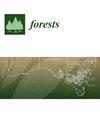Afforestation Enhances Potential Bacterial Metabolic Function without Concurrent Soil Carbon: A Case Study of Mu Us Sandy Land
IF 2.4
2区 农林科学
Q1 FORESTRY
引用次数: 0
Abstract
Elucidating the impact of afforestation on soil bacterial community composition and its potential function in afforestation is imperative for comprehending the biochemical processes of land use change. This study employed high-throughput genomic sequencing to determine the bacterial phylogenetic assembly and assess functional groups following afforestation encompassing shrubland and woodland. Compared with non-afforested cropland, the soil organic carbon (SOC) remained unchanged, but significant alterations were observed in the bacterial composition and potential functions under afforestation. Afforestation enhanced bacterial diversity and even shifted the bacteria from the r- to K-strategy, as indicated by higher oligotroph/copiotroph ratios. Soil properties explained 66.45% and 68.9% of the total variation in bacterial community composition at the phylum level and the functional group. A 60.44% decrease in soil water content, a 3.82% increase in pH, a 7.5% increase in bulk density, and a 66.8% decrease in available phosphorus (AP) were the main soil factors affecting both bacterial community composition and functional traits in afforestation. In particular, lower available nutrients, AP, and nitrate nitrogen in afforestation drive the bacterial life history strategies. We conclude that changes in bacterial metabolic functions due to reduced soil available nutrients from dryland afforestation might be the main driver for microbial-inhibited SOC accumulation. These results could provide strong microbiological evidence to help further evaluate the importance of dryland afforestation.植树造林可增强潜在的细菌代谢功能,但不同时产生土壤碳:乌苏沙地案例研究
阐明植树造林对土壤细菌群落组成的影响及其在植树造林中的潜在功能,对于理解土地利用变化的生物化学过程至关重要。本研究采用高通量基因组测序确定了灌木林和林地植树造林后的细菌系统发育组合并评估了功能群。与未植树造林的耕地相比,植树造林后土壤有机碳(SOC)保持不变,但细菌组成和潜在功能发生了显著变化。植树造林提高了细菌的多样性,甚至使细菌的策略从 "R "转向了 "K",这体现在低营养型/高营养型细菌的比例较高。土壤特性分别解释了66.45%和68.9%的细菌群落组成在门级和功能组上的总变化。土壤含水量减少 60.44%、pH 值增加 3.82%、容重增加 7.5%、可利用磷(AP)减少 66.8%,这些是影响植树造林中细菌群落组成和功能特征的主要土壤因素。特别是,植树造林中较低的可利用养分、AP 和硝态氮推动了细菌的生活史策略。我们的结论是,旱地造林导致的土壤可用养分减少引起的细菌代谢功能变化可能是微生物抑制 SOC 积累的主要驱动力。这些结果可以为进一步评估旱地造林的重要性提供有力的微生物学证据。
本文章由计算机程序翻译,如有差异,请以英文原文为准。
求助全文
约1分钟内获得全文
求助全文
来源期刊

Forests
FORESTRY-
CiteScore
4.40
自引率
17.20%
发文量
1823
审稿时长
19.02 days
期刊介绍:
Forests (ISSN 1999-4907) is an international and cross-disciplinary scholarly journal of forestry and forest ecology. It publishes research papers, short communications and review papers. There is no restriction on the length of the papers. Our aim is to encourage scientists to publish their experimental and theoretical research in as much detail as possible. Full experimental and/or methodical details must be provided for research articles.
 求助内容:
求助内容: 应助结果提醒方式:
应助结果提醒方式:


